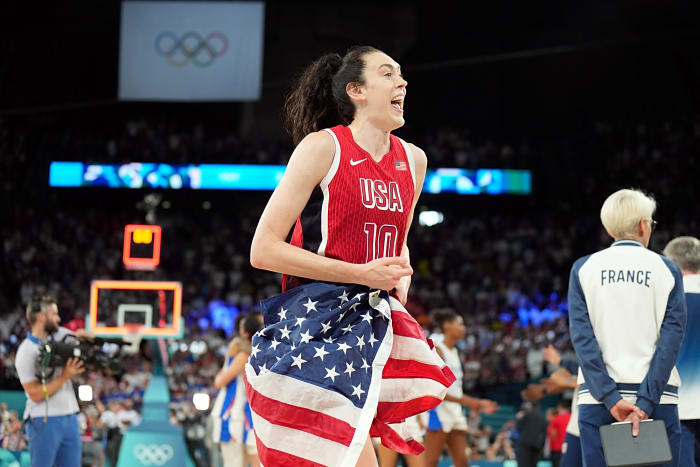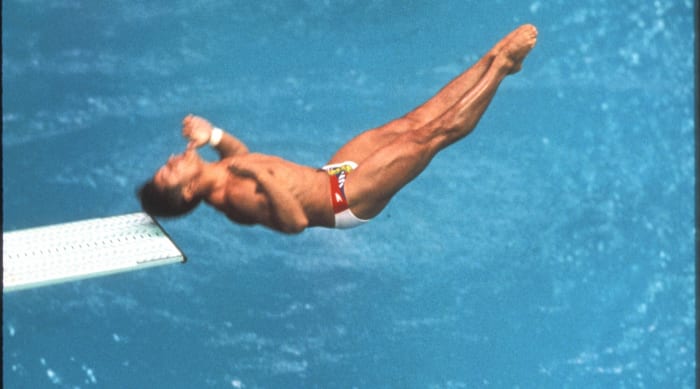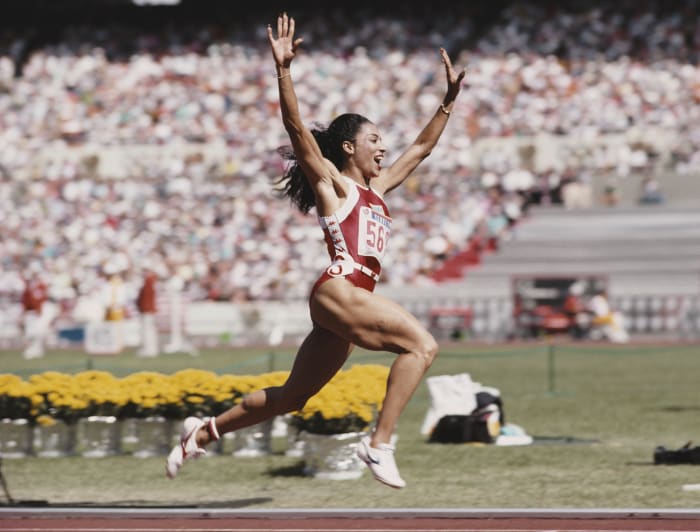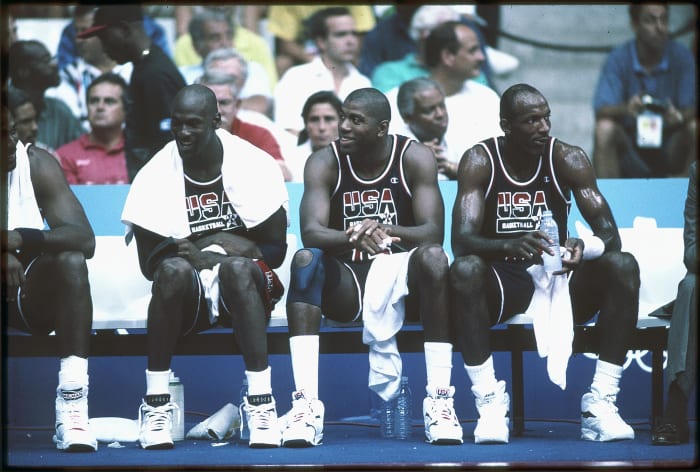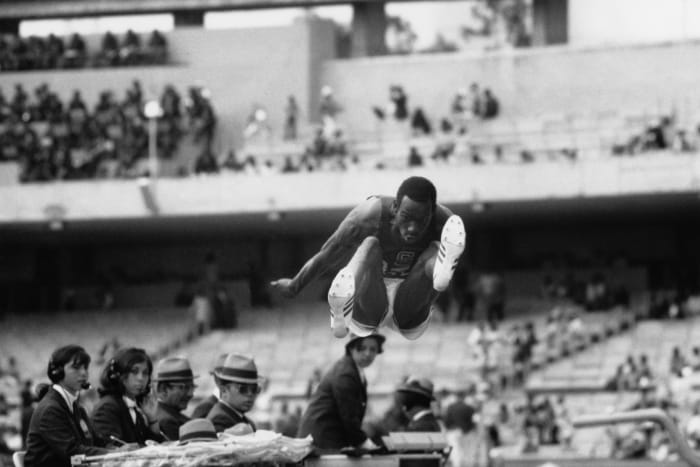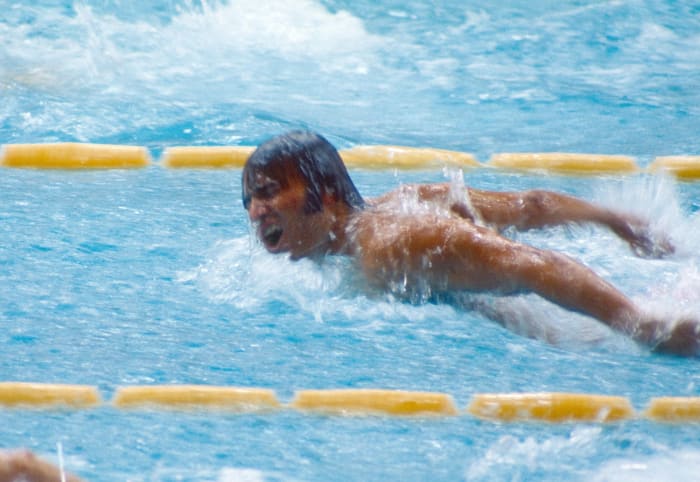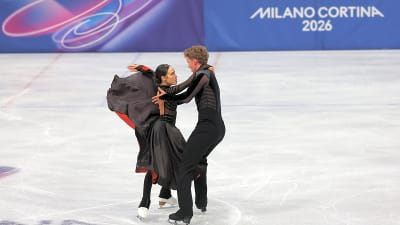Every four years presents another opportunity for American athletes to make lasting memories for both themselves and their country. Here's our list of 25 all-time great Summer Olympic performances from American athletes.
1 of 27
27. U.S. women's hoops runs continues (2024)
James Lang/Imagn Images
A 61st straight Olympic victory for the U.S. women's basketball team proved to be one for the ages at Paris in 2024, and nearly a massive upset was recorded by host France. The French gave Team USA's star-studded lineup all it could handle in the gold-medal game, a back-and-forth affair that left American fans anxious after the squad fell behind by 10 points in the second half. However, 10 fourth-quarter points from Kahleah Copper, Breanna Stewart's strong defense in the final moments, and 21 points with 13 boards from A'ja Wilson were enough for the U.S. to win 67-66. Not before France's Gabby Williams, a former UConn star, sank a last-second basket with her foot on the 3-point line. The American women have won eight straight Olympic basketball gold medals.
2 of 27
26. USA Baseball stuns Cuba (2000)
Jon Buckle/EMPICS via Getty Images
With legendary Los Angeles Dodgers skipper Tommy Lasorda in the dugout, the U.S. Olympic baseball team made a seemingly improbable run to the gold medal at the 2000 Sydney Games. Cuba was the undisputed gold standard in international baseball, and after the U.S. rallied for a 3-2 semifinal win against South Korea, the two teams met with gold on the line. In the greatest game in the history of USA Baseball, Ben Sheets tossed a three-hitter and the Americans stunned mighty Cuba with a 4-0 victory.
3 of 27
25. Before there was Ali, Cassius was golden (1960)
Bettmann/Contributor/Getty Images
Before he became Muhammad Ali, Cassius Clay was a relative unknown boxer trying to make a name for himself on the international stage. Clay was a promising pugilist in his home state of Kentucky and won an AAU national championship, but it was his performance at the 1960 Olympics, at Rome, that truly gave the world a glimpse of the greatness that was to come. Clay won gold in the light-heavyweight division and did not stop there. This, essentially, was the moment his legacy was born.
4 of 27
24. Lee makes all-around history (2020)
Robert Deutsch/USA TODAY Sports
Lee certainly made her Olympic debut quite memorable. If winning bronze on the uneven bars and silver in the overall team competition for the United States at Tokyo, Lee capped things by reportedly becoming the first Asian American woman to win the Olympic all-around gold medal. Lee edged Rebeca Andrade of Brazil to become the sixth American woman to claim the Olympic all-around title.
5 of 27
23. Ailing Strug sticks historic landing (1996)
David Madison/Getty Images
After severely injuring her ankle on an earlier vault at the Atlanta Games in 1996, Kerri Strug had no time to feel sorry for herself. Not with the first-ever American Olympic gymnastics team title within its grasp. Hobbled, but not totally down, Strug delivered one of the gutsiest performances in United States Olympic gymnastics history by sticking her vault landing long enough to secure a score that clinched the team gold. The image of U.S. coach Béla Károlyi carrying Strug out for the medal ceremony remains a piece of Olympic iconography.
6 of 27
22. Louganis' dramatic gold repeat (1988)
Rich Clarkson & Associates/NCAA Photos/Contributor/Getty Images
A five-time Olympic medal winner, Greg Louganis is the only male diver to win back-to-back Olympic golds in the 3-meter springboard and platform (1984, 1988). The latter, however, came with some drama. During those '88 Games in Seoul, Louganis had not alerted the world he was HIV+. So, when he slammed his head on the springboard during the preliminary rounds and suffered a concussion, Louganis was horrified that others could come in contact with any blood on the board or in the water. That was never the case, and Louganis bounced back to remain the king of the Olympic diving well.
7 of 27
21. Coughlin's six pack (2008)
Jed Jacobsohn/Getty Images
Olympic success isn't always measured by the type of medal won. American swimmer Natalie Coughlin enjoyed one of the greatest individual moments in American history at Beijing in 2008 -- winning just one gold medal in the process. Coughlin became the first U.S. woman in the modern Olympic era to win six medals at a single Games. She became the first female to win back-to-back golds in the 100-meter backstroke, but also earned two silvers (4x100 freestyle relay, 4x100 medley relay) and three bronzes (100 free, 200 medley, and 4x200 free relay).
8 of 27
20. Fosbury's famously golden flop (1968)
Bettmann/Contributor/Getty Images
Talk about a trendsetter. Not only did the legendary Dick Fosbury win the high jump at the 1968 Games in Mexico City, but he also essentially reinvented, or perhaps revolutionized, the event with his famed "Fosbury Flop." Simply put, Fosbury was the first high jumper to use a backward, layout maneuver to clear the bar. That technique quickly became copied worldwide and, obviously, remains the preferred method of clearing the bar.
9 of 27
19. Smith, Carlos make their stand (1968)
Bettmann/Contributor/Getty Images
There's arguably no more powerful image than that of American sprinters Tommie Smith and John Carlos standing on the medal podium, each with one black-gloved fist raised following the 200-meter race and while the "Star Spangled Banner" played at the 1968 Mexico City Games. The Black Power salute from Smith, who won gold, and bronze-medalist Carlos both drew inspiration and condemnation -- depending on one's political viewpoint. If there was ever a doubt that sports and politics were intertwined, it was put to rest on Oct. 16, 1968. While the podium moment is truly iconic, it should not be forgotten what Smith and Carlos achieved to reach that moment.
10 of 27
18. Oerter goes 4-for-4 (1968)
Bettmann/Contributor/Getty Images
In 1956, Al Oerter was the surprise winner of the discus competition at the Melbourne Olympics. However, it proved to be the start of a historic run for the American. By 1968, at age 32, Oerter was still a contender on the international scene and trying to become the first track-and-field Olympian to win four consecutive golds. Oerter, though, wasn't favored at Mexico City but managed to top favored teammate Jay Silvester with an Olympic-record throw of 64.78 meters to make history.
11 of 27
17. Surgery can't stop Benoit (1984)
Tony Duffy/Allsport/Getty Images
It was about two weeks before Joan Benoit was to run the marathon at the U.S. Olympic trials for the 1984 Summer Games in Los Angeles that she underwent arthroscopic knee surgery. Sounds major? Well, Benoit recovered in time to win the event and then claim the first Olympic gold medal awarded in the women's marathon. It was another groundbreaking L.A. moment for a U.S. track and field team that won 40 medals -- 16 golds -- at those '84 Games on home soil.
12 of 27
16. Rudolph runs wild (1960)
Bettmann/CORBIS/Bettmann Archive/Getty Images
The great Wilma Rudolph got her first taste of Olympic success in 1956 by winning a bronze medal as part of the American 4x100-meter relay team. However, it was the 1960 Summer Games at Rome where Rudolph earned the title of the "fastest woman in the world." She took home gold in both the 100- and 200-meter dashes, and again as part of that 4x100 relay squad. Considering that Rudolph dealt with pneumonia, scarlet fever, and polio in her early years, these Olympic accomplishments are truly amazing.
13 of 27
15. Johnson's daunting double (1996)
Alexander Hassenstein/Bongarts/Getty Images
A 200- and 400-meter double victory is a grueling task for even the elite sprinters in the world. However, the great Michael Johnson made it look easy at the 1996 Summer Games in Atlanta. Sporting those famous gold track shoes, Johnson became the only male athlete to win both the 200 and 400 in the same Olympics. If that wasn't enough, he posted a world-record 19.32-second time in the 200. Four years later at the Sydney Games, Johnson repeated as 400 m Olympic champion.
14 of 27
14. You go "Flo-Jo" (1988)
Russell Cheyne/Allsport/Getty Images
The great "Flo-Jo," Florence Griffith Joyner, made a name for herself at the Los Angeles Summer Games of 1984, but became a national athletic and pop culture icon after her performance at the '88 Seoul Games. She won the 100 meters (roughly .30 seconds ahead of silver medalist Evelyn Ashford), set the world record in the 200 (21.34 seconds), and was part of the gold-medal-winning 4x100-meter relay squad and 4x400 group that took home silver.
15 of 27
13. Ledecky gets better with age (2016; 2024)
Rob Schumacher/USA TODAY Sports
If Olympic fans thought Katie Ledecky stole the show as a promising 15-year-old in 2012, when she won the 800-meter freestyle, she blew the roof off Rio's aquatic center at the 2016 Summer Games. Her four 2016 gold medals (200 free, 400 free, 800 free, and 4x200 relay) and a silver (4x100 relay), plus two world records in the process, made her the most decorated female at the Rio Games. In 2020, the 28-year-old Ledecky repeated as 800 champ, also won the 1,500 free, and brought home two silvers. At the 2024 Games in Paris, Ledecky took home four more medals, including two gold. One as the first four-time winner of the 800 meters and again in the 1,500. Ledecky owns nine Olympic gold medals, the most of any female U.S. swimmer at the Olympics. Her 14 total Olympic medals make her the most decorated American female athlete in Olympic history.
16 of 27
12. Jenner shatters decathlon world record (1976)
Staff/Allsport/Getty Images
Bruce Jenner put forth one of the greatest Olympic performances of all time with his gold-medal-winning effort in the decathlon at the 1976 Summer Games in Montreal. Jenner, who set personal bests in eight of the 10 events, rallied from second place after Day One to win the grueling event with a world-record score of 8,618 points. Jenner became a national icon, with his face plastered on Wheaties' boxes across the country.
17 of 27
11. Hoop dreams come true (1992)
Staff/Icon Sportswire/Getty Images
Complete with a roster that included Michael Jordan, Larry Bird, Magic Johnson, and Charles Barkley, the U.S. men's basketball team, aka "The Dream Team," should have been given their gold medals before the 1992 Summer Games in Barcelona tipped off. The Americans dominated every game as expected, with their closest margin of victory coming by 38 points versus Puerto Rico in the semifinals. They beat Venezuela 80-47 in the gold-medal contest. Barkley averaged a team-leading 16.3 points -- one of seven players pouring in double-figure points per contest.
18 of 27
10. Beaman reaches great lengths (1968)
Douglas Miller/Keystone/Getty Images
As noted, the historic accomplishments among U.S. athletes at the 1968 Summer Games were many and remarkable. Bob Beamon's performance in the long jump at the Games remains one of the great individual accomplishments in Olympic history. The favorite to win the event at Mexico City, Beamon not only prevailed but shattered the world record with his leap of 8.90 m (29.2 feet). His historic hop stood as the record for nearly 23 years and remains the benchmark in Olympic competition.
19 of 27
9. Well-decorated Dressel (2020)
Rob Schumacher/USA TODAY Sports
The magnificent Dressel is a seven-time Olympic swimming gold medalist. Five of those medals came during the 2020 installment in Tokyo. By doing so in the 50-meter freestyle, 100 free, 100 butterfly, and as a member of the 4x100 free relay and 4x100 medley relay, Dressel became the fifth American to win five gold medals any Olympic Games, after 1970 -- joining fellow swimmers Mark Spitz, Michael Phelps and Matt Biondi and speed skater Eric Heiden. He was also the first male swimmer, from any country, since 1896 to win Olympic gold in the 50 free, the 100 free, and the 100 butterfly at the same Games.
20 of 27
8. Biles' Rio bounty (2016)
Robert Deutsch/USA TODAY Sports
Simone Biles has drawn attention to herself inside and out of the gym, and has become one of the most revered athletes in U.S. Olympic history. When discussing her Summer Games legacy, Biles attributes it all to her performance at the 2016 Rio Olympics. Biles' four gold medals (all-around, team, vault, floor exercise) during the competition were the most ever by a U.S. women's gymnast at a single Games. It also marked the first time since Romania's Ecaterina Szabo in 1984 that any gymnast won gold four times at a single Olympics.
21 of 27
7. Comeback complete for Biles (2024)
Kyle Terada/Imagn Images
Sticking with Biles, the biggest individual success story of the 2024 Olympics from a U.S. standpoint is that of the celebrated gymnast. Out of the shadows of her issues from the Tokyo Games three years ago, Biles was masterful while winning gold in the all-around competition, vault, and with her American pals in the team final competition. Biles raised her medal total to 14 and is the most decorated Olympic gymnast in U.S history.
22 of 27
6. Bionic Biondi (1988)
Simon Bruty/Getty Images/Getty Images
By the time Matt Biondi's illustrious Olympic swimming career ended, he was an 11-time medal winner -- eight of the gold variety. His greatest Olympic moment came during the 1988 Summer Games in Seoul. Biondi won five gold medals -- 50-meter freestyle, 100 free, 4x100-meter freestyle relay, 4x200 relay, and 4x100 medley relay. Taking it a step -- or stroke -- further, Biondi set a world record in the 50, and as part of all three relay squads. For good measure, Biondi also won silver in the 100 butterfly and bronze in the 200 free at Seoul.
23 of 27
5. Mary Lou's magical moment (1984)
Focus on Sport/Getty Images/Getty Images
"America's Sweetheart," dynamo Mary Lou Retton has become an Olympic icon, even though things haven't been easy for of late. A made-for-prime-time moment, Retton rallied to become the first American woman to win the Olympic gymnastics all-around title. At the 1984 Olympics in Los Angeles, she did so with a banged-up knee and perfect 10s in her final two exercises -- the floor exercise and vault. Retton's exuberance and unforgettable smile upon nailing the landing on back-to-back vaults have been captured in time. In addition to the all-around gold, Retton won two silvers (team event, vault) and two bronze (uneven bars, floor exercise) medals.
24 of 27
4. Lewis' unforgettable debut (1984)
David Madison/Getty Images
Olympic debuts don't get much better than the one legendary sprinter Carl Lewis had during the 1984 Games. Complete with some ridiculous talent and that million-dollar smile, Lewis won all four events he entered at Los Angeles -- 100 meters, 200, 4x100-meter relay (with a world-record time of 37.83 seconds) and the long jump. That overall performance kicked off an Olympic career in which Lewis won nine gold medals and a silver medal for one of the greatest legacies of all time. We'll forget about that national anthem singing incident, however.
25 of 27
3. Seven heaven for Spitz (1972)
Gerry Cranham/Offside via Getty Images
The controversial U.S. basketball loss against the Soviet Union and the Israeli athlete massacre overshadowed some joyous moments of historical proportions at the Munich Games in 1972. None bigger than the seven gold medals American swimmer Mark Spitz won at these Games. He won individual gold in the 100-meter freestyle, 200 free, 100-meter butterfly, 200 fly, as well as a member of the 4x100-meter free relay, 4x200 free relay, and 4x100 medley relay. Spitz's record-medal count for a single Games lasted 36 years, but it remains one of the most remarkable individual performances for the time.
26 of 27
2. Phelps' great eight (2008)
Sunshine/zuma/ICON SMI
Michael Phelps' true moment of Olympic greatness came in 2008 at Beijing. These were the Games that cemented and defined his legacy as one of the most superior performers in Olympic history. With his eight gold medals at these Games, Phelps, a 23-time Olympic medalist, surpassed Mark Spitz's 1972 mark, which had seemed unbreakable for decades. Five of those first-place finishes came individually, while the other three as a relay member. Perhaps most impressive about Phelps' performance at Beijing, was that he set -- or was part of -- seven world-record swims.
27 of 27
1. Owens' statement performance for the ages (1936)
Staff/Getty Images
Jesse Owens was a star even before he won four gold medals (100 meters, 200 meters, 4x100 relay, long jump) at the 1936 Summer Games in Berlin. However, those victories were essentially a slap in the face to Adolf Hitler, who looked on while a black man dominated these Games and shot holes in the Fuhrer's myth of "Aryan Supremacy." It was not only one of the great Olympic moments of all time, but perhaps most importantly, when it came to the relationship between sports and politics on an international stage. It was a performance that still resonates today -- spanning generations at every corner of the globe.
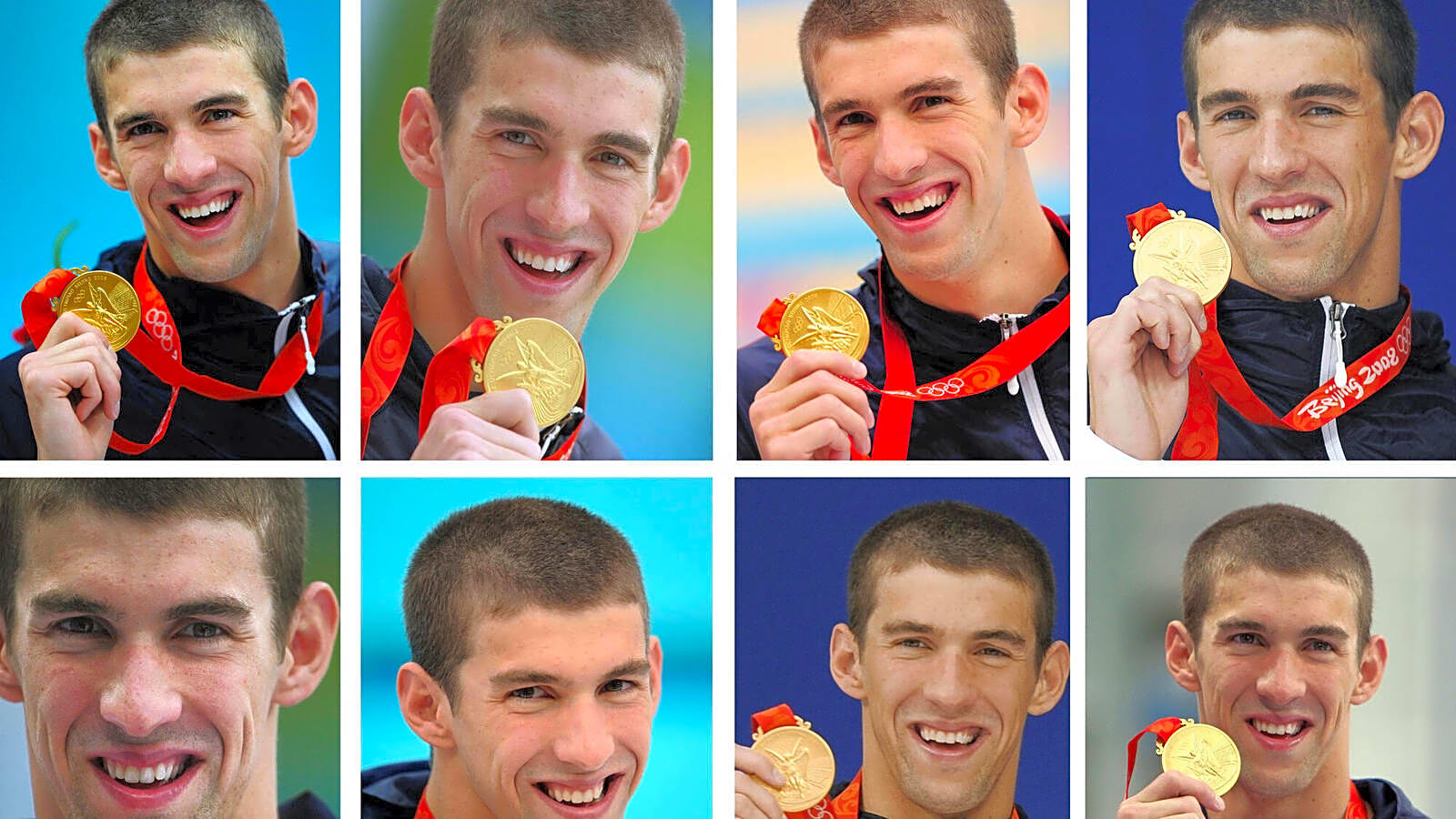
 +
+
